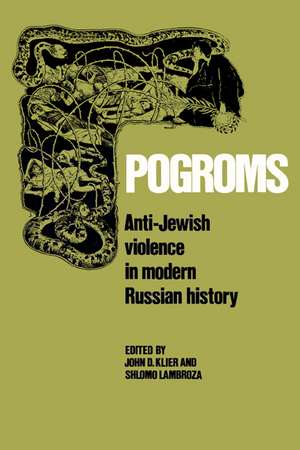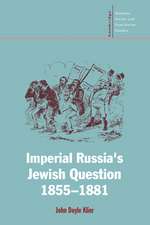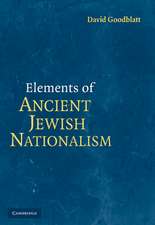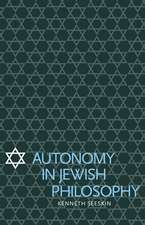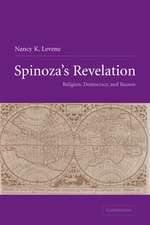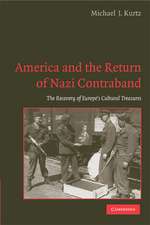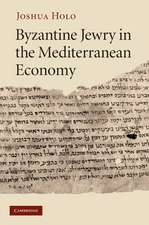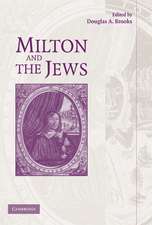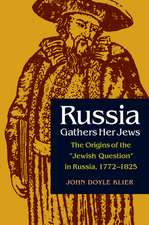Pogroms: Anti-Jewish Violence in Modern Russian History
Editat de John Doyle Klier, Shlomo Lambrozaen Limba Engleză Paperback – 11 feb 2004
Preț: 389.26 lei
Nou
Puncte Express: 584
Preț estimativ în valută:
74.49€ • 77.30$ • 62.26£
74.49€ • 77.30$ • 62.26£
Carte tipărită la comandă
Livrare economică 17-31 martie
Preluare comenzi: 021 569.72.76
Specificații
ISBN-13: 9780521528511
ISBN-10: 0521528518
Pagini: 416
Dimensiuni: 152 x 228 x 27 mm
Greutate: 0.63 kg
Ediția:Revised.
Editura: Cambridge University Press
Colecția Cambridge University Press
Locul publicării:Cambridge, United Kingdom
ISBN-10: 0521528518
Pagini: 416
Dimensiuni: 152 x 228 x 27 mm
Greutate: 0.63 kg
Ediția:Revised.
Editura: Cambridge University Press
Colecția Cambridge University Press
Locul publicării:Cambridge, United Kingdom
Cuprins
Part I. General Introduction: 1. Russian Jewry on the eve of the pogroms John D. Klier; 2. The pogrom paradigm in Russian history John D. Klier; Part II. The Pogroms of 1881–1884: 3. The anti-Jewish pogroms in Russia in 1881 I. Michael Aronson; 4. 'Black repartition' and the pogroms of 1881–1882 Moshe Mishkinsky; 5. Cosomopolitanism, antisemitism, and populism: a reappraisal of the Russian and Jewish socialist response to the pogroms of 1881–1882 Erich Haberer; Part III. The Impact of the First Pogrom Wave: 6. The development of the Russian Jewish community, 1881–1903 Alexander Orbach; 7. Tsarist officialdom and anti-Jewish pogroms in Poland Michael Ochs; Part IV. The Pogroms of 1903–1906: 8. The pogroms of 1903–1906 Shlomo Lambroza; 9. The pogrom of 1905 in Odessa: a case study Robert Weinberg; Part V. The Pogroms of 1919–1921: 10. Pogroms and white ideology in the Russian civil war Peter Kenez; Conclusion and overview Hans Rogger; Bibliographical essay Avraham Greenbaum.
Recenzii
"...impressive collection of essays...superb introductory pieces by John Klier...consistently tight editing...This book will prove invaluable not only to students of Russian, Polish, and Jewish history, but also to scholars of other disciplines focusing on mass movements, modern antisemitism, and ethnic group relations." Shofar
"A unique collection of well-written scholarly essays...The essays make clear that the old view that Russian pogroms were primarily a result of tsarist government encouragement is simply not accurate." Choice
"...should be required reading for students of Russian and Jewish history and for persons interested in ethnic violence in general." Bernice Glatzer Rosenthal, Journal of Modern History
"This valuable collection of essays focuses on the three major waves of pogroms that took place almost exclusively on Ukrainian ethnolinguistic territory during the late nineteenth and early twentieth centuries...the collection represents a very positive contribution to the scholarship on this topic, and will be appreciated by specialists in the history of the Jews of the region as well as researchers involved in broader issues." Henry Abramson, University of Toronto, in Journal of Ukrainian Studies
"Klier's study has richly added to our picture of the Russian version of [the] debate." Nationalities Papers
"...a striking quality of Klier's book is its factual solidity..." Journal of Modern History
"A unique collection of well-written scholarly essays...The essays make clear that the old view that Russian pogroms were primarily a result of tsarist government encouragement is simply not accurate." Choice
"...should be required reading for students of Russian and Jewish history and for persons interested in ethnic violence in general." Bernice Glatzer Rosenthal, Journal of Modern History
"This valuable collection of essays focuses on the three major waves of pogroms that took place almost exclusively on Ukrainian ethnolinguistic territory during the late nineteenth and early twentieth centuries...the collection represents a very positive contribution to the scholarship on this topic, and will be appreciated by specialists in the history of the Jews of the region as well as researchers involved in broader issues." Henry Abramson, University of Toronto, in Journal of Ukrainian Studies
"Klier's study has richly added to our picture of the Russian version of [the] debate." Nationalities Papers
"...a striking quality of Klier's book is its factual solidity..." Journal of Modern History
Descriere
Distinguished scholars of Russian Jewish history reflect on the pogroms in Tsarist and revolutionary Russia.
